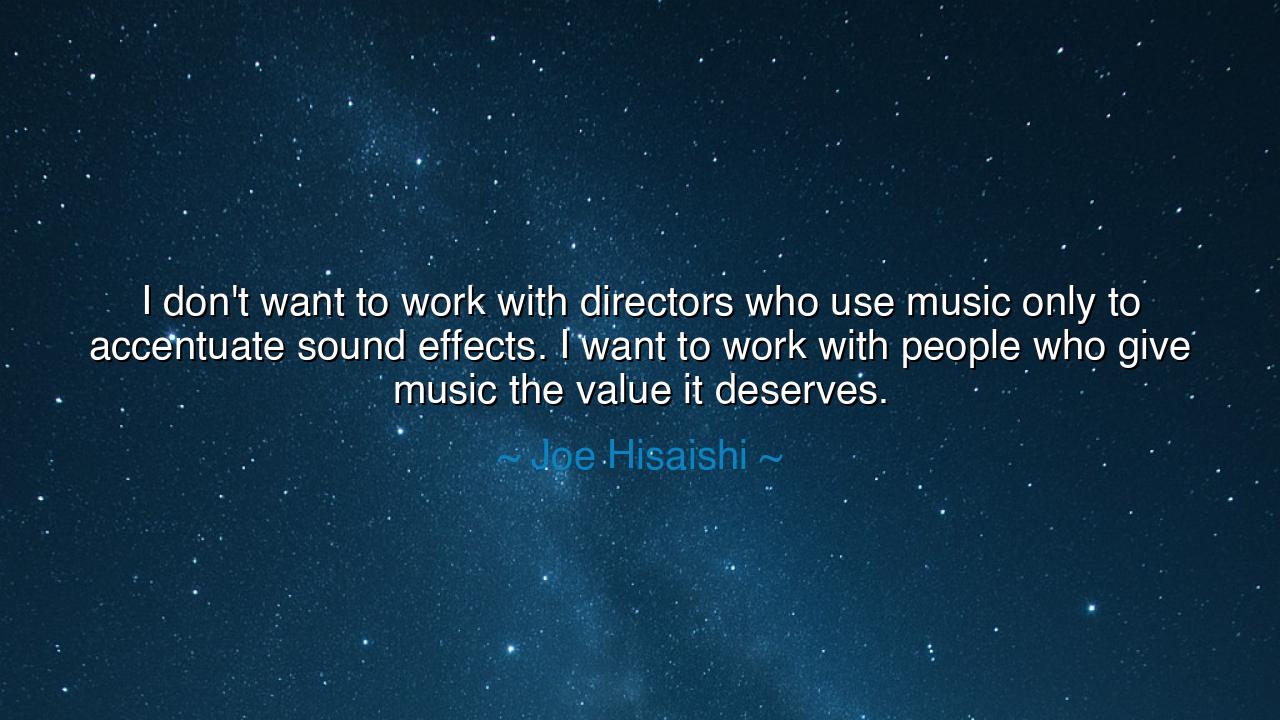
I don't want to work with directors who use music only to
I don't want to work with directors who use music only to accentuate sound effects. I want to work with people who give music the value it deserves.






Hearken, children of the future, to the words of Joe Hisaishi, the great composer of our age, who declared: “I don’t want to work with directors who use music only to accentuate sound effects. I want to work with people who give music the value it deserves.” This is no idle complaint, but the cry of an artist whose soul knows that music is not mere ornament, not a tool to decorate noise, but a vessel of truth and spirit. It is the breath between words, the unseen hand that lifts a story beyond flesh and into eternity.
For the ancients too knew that music was divine. Pythagoras, wise in number and harmony, taught that the very stars moved in music, their spheres singing a song too great for mortal ears. King David of old played his harp to soothe the troubled heart of Saul, proving that music holds not only beauty but healing power. Thus when Hisaishi demands that it be given the “value it deserves,” he speaks with the voice of all ages, crying out against the reduction of art into mere utility, and reminding us that melody carries the soul of creation itself.
Consider the story of the great composer Beethoven, who even in his deafness, created symphonies that thundered through history. His music was not written to mirror the crash of swords or the sound of storms, but to reveal the majesty of the human spirit—the struggle, the sorrow, the triumph of life. Had he written only to imitate sound, he would have been forgotten; yet because he honored music as its own language, his voice endures forever. In this, Beethoven and Hisaishi are kin, both proclaiming that music must not be chained to noise, but exalted as a force greater than words.
When music is reduced to mere sound effect, it loses its power. It becomes background, unnoticed, forgotten. But when music is treated as a living companion to story, it transforms the tale itself. Think of Hisaishi’s work with Studio Ghibli, where his melodies do not simply echo footsteps or storms, but open hidden doors to wonder. In Spirited Away, his gentle notes guide us into mystery; in Princess Mononoke, his soaring themes cry out with the voice of nature itself. Without his music, the films would be shadows; with it, they become timeless.
Thus the teaching is clear: never treat music—or any form of art—as something lesser. To do so is to silence the gods within it. Art must be honored, not exploited, for in it dwells the reflection of our own humanity. The painter does not smear color to cover walls, but to reveal visions; the poet does not write for mere rhyme, but to carve meaning from silence. Likewise, the composer does not write to mimic sound, but to unveil truth hidden in harmony.
Practical wisdom follows: when you encounter music, do not treat it as background noise. Listen. Let it speak to you. If you are a creator, do not use art as an accessory, but as a partner in your vision. And if you are a listener, honor it by giving it space in your heart. Ask yourself not only what sounds you hear, but what spirit moves behind them. For in that space, you will find not just entertainment, but revelation.
So let it be known: music is not a servant of sound, but the voice of the soul. Hisaishi’s words are a reminder that art must be honored, not diminished. Take this truth with you, children, and let your works—whether in song, in story, or in silence—be given the value they deserve. For to honor music is to honor life itself, and to treat it as divine is to walk in harmony with the eternal.






AAdministratorAdministrator
Welcome, honored guests. Please leave a comment, we will respond soon